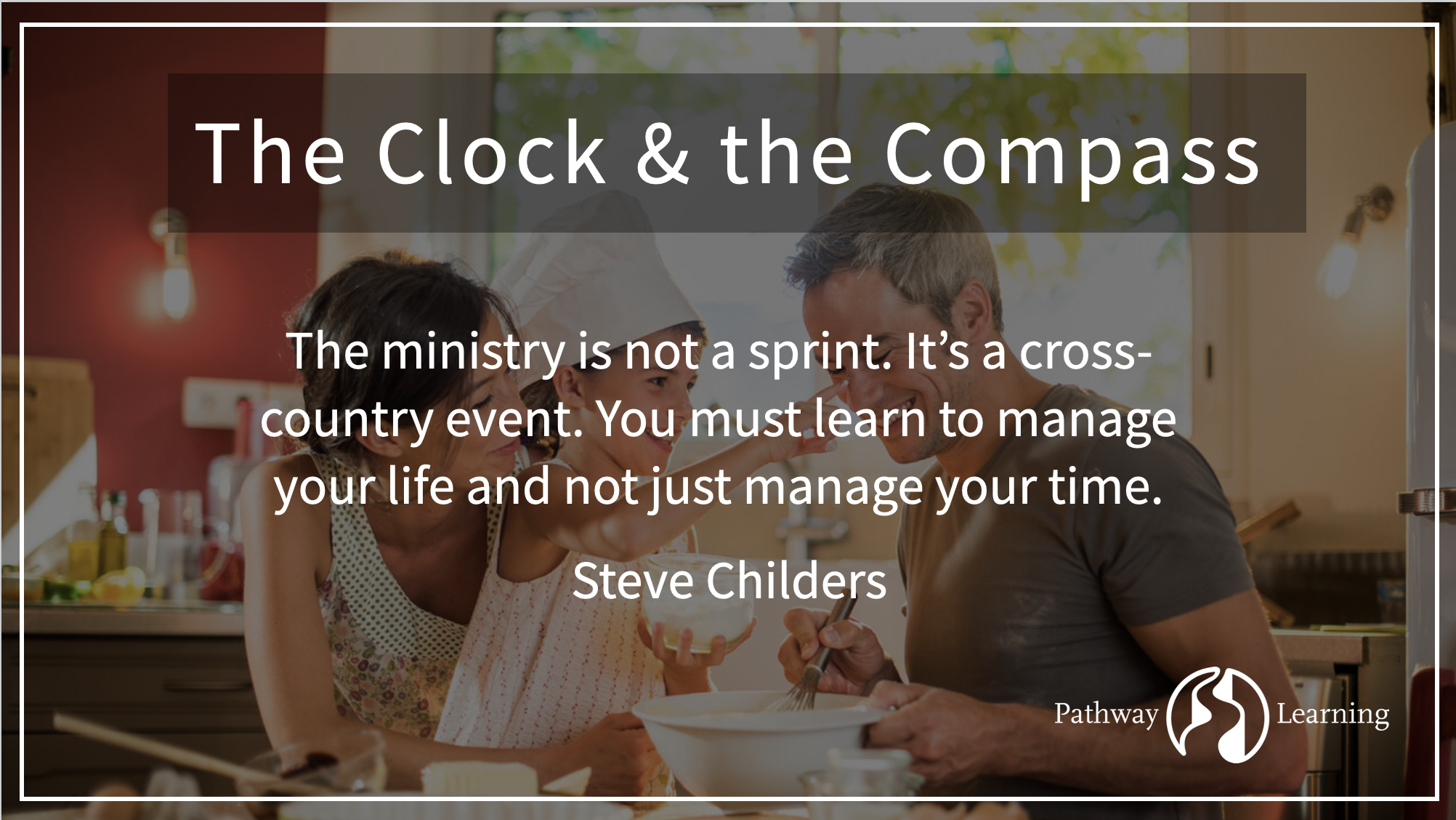Your Time vs. Your Priorities: Priorities, Lesson 2
Series: Priorities
Author: Dr. Steven L. Childers
Title: Your Time vs. Your Priorities
Another important lesson that church leaders often learn is the big difference between managing their time and managing their lives. There is an ongoing contrast and competition between two things that continually influence our lives. One author describes them as the clock and the other one as the compass. The clock represents how we use our time, such things as our commitments each day or each week, our appointments, our schedule, our goals and activities. It's how we use and manage our time. The compass represents our core life values, our conscience, our sense of personal vision and life mission. It's what we believe is truly important in life and how we manage our lives.
The struggle comes when we experience a gap between the compass and the clock, when what we actually do with our time doesn't contribute to what is truly most important in our lives. In an effort to close this gap between the compass and the clock, many turn to the field of personal time management. Traditional time management theory suggests that by doing things more efficiently, you'll eventually gain control of your life and that increased control will bring you personal peace and fulfillment.
Although there is much to gain from such things as planning and prioritizing and goal setting, the bottom line is that increased efficiency does not necessarily lessen the gap between the compass and the clock. Although people may get more done in less time, what they are actually doing with their time is still often not what truly matters to them most.
How many church leaders on their deathbed do you think wish that they had just spent more time at the church? In his classic article Tyranny of the Urgent, Charles Hummel writes, "Have you ever wished for a 30 hour day? Surely this extra time would relieve the tremendous pressure under which we live. Our lives leave a trail of unfinished tasks, unanswered letters, unvisited friends, unwritten articles, unread books, haunt quiet moments when we stop to evaluate. We desperately need relief." Would a 30 hour day really solve the problem? Wouldn't we soon be just as frustrated as we are now with our 24 hour allotment? As the old saying goes, "A mother's work is never done." Neither is that of a student, a teacher, a church leader, or anyone else we know, nor will the passage of time help us catch up. Children grow in number and in age to require more of our time. Greater experience in our ministry often brings more exacting and demanding assignments so we find ourselves working more and enjoying it less.
The key lesson here that many leaders have discovered is not to prioritize your schedule but to schedule your priority. Our problem is letting the urgent things in life crowd out the truly important things. We live in a constant tension between the urgent and the important. We become slaves to the tyranny of the urgent. In Isaiah 30 verse 15 we read, "For thus the Lord God, the holy one of Israel says, 'In repentance and rest you shall be saved. In quietness and trust is your strength.'" At the root of our frantic propensity to overwork in the ministry, is usually the sin of pride, an exalted sense of our importance to the kingdom of God. If we dare to stop, the kingdom of God just might not make it and the church would surely self-destruct, we think. Some church leaders need to show their faith in God not by working harder, but by working less.
Some of you may have been hitting it so hard for so long that you desperately simply need extended time to rest. For some of you, it might even be six months. For others, it might be six weeks or six days. For some of you, the most spiritual thing you can do is learn to go to bed and sleep. A seasoned missionary once came up to me at a church leader training conference and said there are two types of missionaries that he has observed in his country. He said those who take siestas or naps every day and those who leave the field. He went on to say if church leaders don't learn to take periodic times to rest and be replenished physically, mentally, relationally and spiritually on their first term, they will almost never be back for a second term.
It's one thing for you to start your ministry well. It's another thing to finish it well. Remember that the ministry is not a sprint. It's a cross-country event so you must learn to pace yourself. You must build into your life a sabbath rhythm of work and rest, work and rest daily, weekly, quarterly, yearly. Hear the words of Jesus that he once said to his weary, tired disciples, "Let's pull away from the ministry and go to the other side of the lake." You must learn to manage your life and not just manage your time.
Choose Your Learning Pathway


